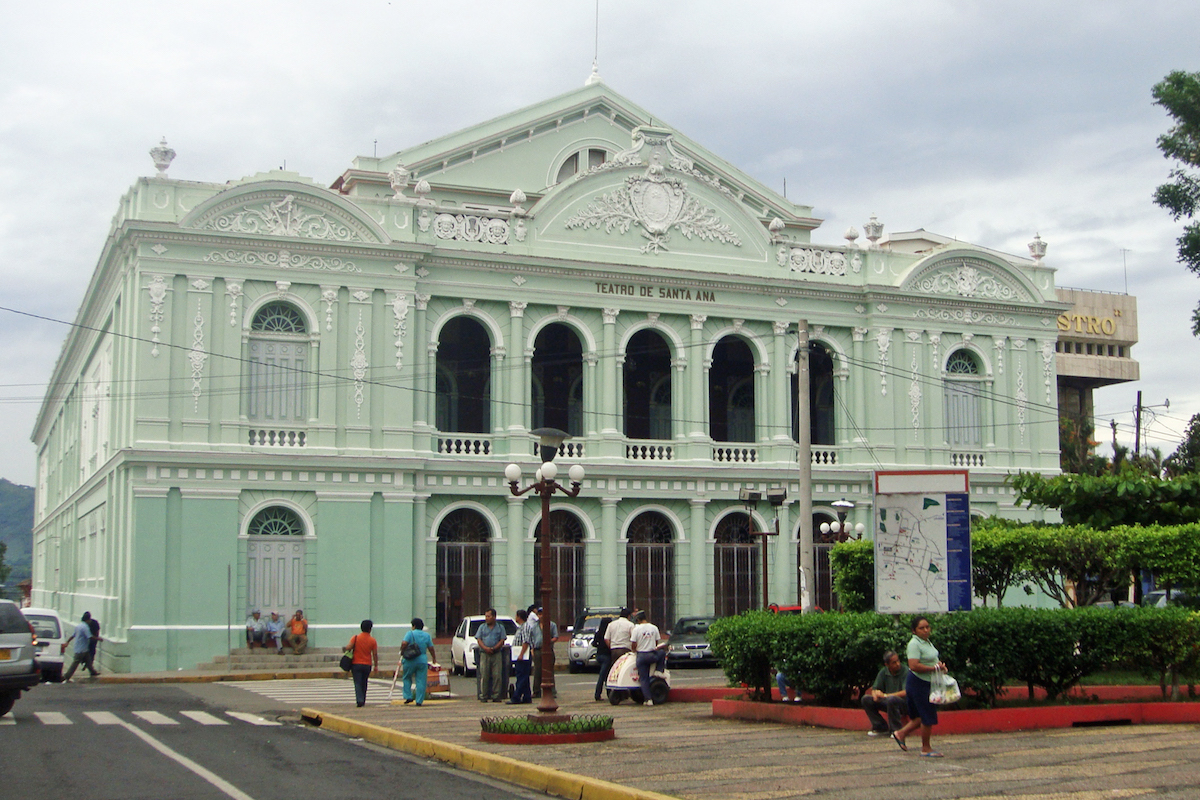

Santa Ana Theater in Santa Ana, El Salvador (Photo by Mario Roberto Durán Ortiz/ Creative Commons Attribution-Share Alike 3.0 Unported license)
Dear Mom And Dad
Pablo, Santa Ana
Dear dad and mom,
I never got to mourn people I loved when I left.
We left in a rush, no luggage, just a bag como de hule with fake passports.
I must have heard like a million times it was too dangerous to see their coffins.
Your duty was to take us alive from the country. Y punto.
I was twelve years old and I didn’t understand anything about this duty.
My heart was in the funeral saying a last goodbye to my cousin and uncles and dad.
Whatever happened the next three days is erased from my memory. It never happened. Me niego a que haya pasado. It doesn’t exist. It was like living in two parallel worlds. Like the first time I watched Stranger Things I was like, holy crap, that’s how I visioned that period. I was on the side listening to words spoken under water.
Days passed by, months, years, my body was like a zombie. I ate without tasting for a long time. I slept without dreaming. I showered without feeling the water. I turned into a robot and obey every order because the word no had no meaning.
The first time I noticed a color that took me out of my numbness was a yellow mango I saw in a bodega. I grabbed it and it told me I was no longer home. It smelled like a strange fruit.
I had eaten a million of them back in El Salvador. This one was not that.
The second time my encounter was with a guayaba. It was harder. The smell was off. I thought my palate was going through a crisis of some sort…
My other relatives began to get worried because homesickness never lasted this long for anyone. Normally people adjust quickly and jump right into it. In my thoughts, even eight months later, I was processing why my relatives had been killed. The void had made a home in my heart.
Everywhere I went and everyone I met extended advice on how to get adjusted to this new amazing and beautiful country full of opportunities. What I saw instead was dirt, chaos, lost souls, a fast-paced environment that seemed to be heading nowhere as the cold winter breeze had frozen their spirit of just making eye contact with another human.
I began going to a school guarded by police checking if students were bringing guns. I didn’t speak English then and the spectacle resembled more of a prison than a school. Before lunch time, cops had rushed through the hallways after hearing shots. There was a confrontation between two students fighting over a girl.
I walked home thinking about my school back home. The structure was rudimentary, basic desks, floors were cleaned, and the teacher was respected. This other place was the opposite, students talking rudely to the teacher, throwing things at her, and walking out of the classroom whenever they felt like it. I learned fear and nothing else that first day.
I got home and told my mom I didn’t want to be in this country. Told her about how awful students were towards their teachers. She asked me if I would rather go back home where I’d be killed. And there was a part of me that wanted to say yes.
I decided to start writing during class while the distractions were happening. I tried to be attentive to the teacher because I know how much she was struggling and I even saw her crying in the bathroom once. She gave me a sketch book and told me that I should scribble whenever I was feeling stressful.
My mom discovered the notebook and threw it away telling me this is not something one learns in school. I felt horrible because I couldn’t show up the next day without one. I told my teacher the truth. She went to the drawer and grabbed another one except this time I was told to leave it in class.
I wrote and wrote and wrote every Spanish word I can think of in no particular order. I had been deprived from speaking it because I was in an only-English mode. I wasn’t allowed to watch Spanish television nor have friends who spoke Spanish. I was encouraged to americanizarme because it was the only way I could make it. After all, my uncles had been in the U.S. for a long time and that’s what they had done. Even my cousins told me not to juntarme con otros hispanos because the majority of them had no papers. I needed to make friends with white students.
When she asked me how the notebook was coming along I showed her. She went back to her desk and this time brought me a book in Spanish. It was a Reader’s Digest. Seeing an actual book no matter what it was in Spanish made my heart so happy. I devoured it in one day and the next week I was getting another one.
It was reading those texts in Spanish that helped me cry less and less from being uprooted from El Salvador. Reading saved my life. And I wish I can thank her now for what she did but I learned that she had died in an accident. Her books had been donated to the school library where I hope they could help heal the wounds of another exile like myself.
With love and respect,
Pablo
***
For more Stories From El Salvador, visit their site here. If you want to share your own story, contact them here. You can follow the group on Instagram @storiesfromelsalvador or on Facebook.


